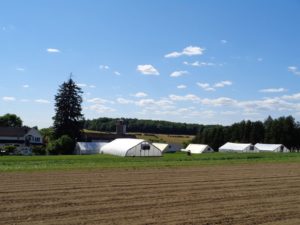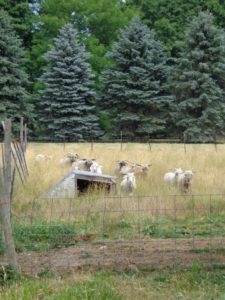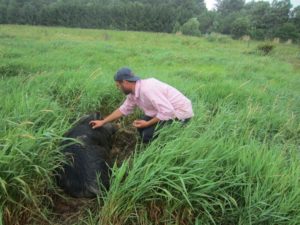Profit Teams Help Farmers Improve Practices and Bottom Line
by Claire Cekander
As beginning farmers developing their businesses beyond the first three years, each begins to evolve a slightly different method of farming. Whether the difference lies in the animals raised, vegetables grown, or interactions with the community, every farmer has a unique approach to earning a living from the land. Farmers at this stage arrive at successful practices through trial and error and by learning from already established farmers. Yet, this experimental stage of developing a farm business can be vulnerable, as farmers struggle to assess changes needed in production, marketing, and business practices to achieve the highest profitability.
To try and help farmers at this stage in their venture, the Cornell Small Farms Program developed the Beginning Farmer Profit Team Program. The Profit Team program aims to support small farms in New York State by providing financial assistance for farmers in their 3rd – 9th year of business to meet with experienced consultants. Farmers can work with a consultant in any field, with the main goal being to increase profitability. Much like their farming practices, farmers have used the Profit Team Program in unique ways, but all with the goal of making their farm more successful.
Allan Gandelman of Main Street Farms has spent the past five years watching his farm expand. Once a high school social studies teacher, he became unsatisfied with the quality of food served in the school cafeteria. He decided to leave the school and start a farm with goals to continue to educate children, this time about healthy local food. To help start his farm, Allan applied to the Profit Team Program seeking aid to shadow successful farmers. Allan chose to increase his profitability by learning methods of farming through observing a variety of techniques. The Profit Team Program allowed him to visit established farms and learn by interviewing farmers and documenting successful methods. After one year in the Profit Team Program, Allan started expanding Main Street Farms. Just last year, the farm operated on 10 acres and now Main Street Farm is producing on 30 acres. As Main Street Farm continues towards their plan of converting 180 acres into usable farmland, Allan’s main goals are to stay connected to the community. His parting advice to aspiring farmers is to remember that “teaching people what to do with vegetables is just as important as growing them”.
On the west side of Seneca Lake, Shannon Ratcliff and Walter Adam of Shannon Brook Farm, a NOFA-NY Certified Organic farm, are raising free-range chickens, Pekin ducks, chicken eggs, grass-fed lamb, and pastured pork. After living and working in New York City, Shannon and Walter bought land and retired to their farm. As they started to raise animals, Shannon Brook Farm started moving toward a silvopasture (animals mixed with trees) method of grazing. They use a multi-species, rotational grazing system as a way to protect the animals, and plan to fully integrate silvopasturing into their farming method and use it to reclaim overgrown, underutilized land.
Pigs till and fertilize the land and take down buckthorn, multiflora rose and other invasive species, which enables pasture to grow for the sheep and cattle to graze. While the pigs and Scottish Highland cattle have removed much of the brush that used to cover their pasture land, the back acres of the property remain wooded and shady. Shannon and Walter wanted to utilize this part of their property to be more profitable, so they applied to the Profit Team Program. The Profit Team Program is helping Shannon Brook Farm survey 65 acres of wooded land by consulting with an agroforestry specialist on how they can incorporate their unused acres into their silvopasture design. Even with the extra labor of operating a livestock farm using a silvopasture method, Walter advises those interested in farming to “Do it, jump in, and don’t look back”. As Shannon Brook Farm continues to farm sustainably while using the Profit Team Program to maximize their usable land, the profitability of the farm is set to increase.
Lisa Ferguson of Laughing Goat Fiber Farm has been farming in Ithaca for 16 years because of her passion for her animals. Laughing Goat Fiber Farm is the home of goats and alpacas that are raised for their fiber. Lisa’s enthusiasm for her farm is apparent in how she connects to her animals. “I love goats,” she says, “because they’re independent animals, they’re fun, and have unique personalities.” While Lisa has more than enough energy to care for her animals, the Profit Team Program helped her out on the business side of farming. In order to make her fiber business more profitable, Lisa consulted with a lawyer to obtain an LLC for her farm. With a more efficient business structure, Lisa can focus on growing her business. She recently purchased four commercial mills to knit her Mohair, Cashmere, and Alpaca fiber right on the farm. As Laughing Goat Fiber Farm becomes more profitable and productive, hopefully Lisa will be able to spend more time in the barn, or what she calls, “heaven”.
If you’ve eaten pork from The Piggery in Ithaca, NY, chances are your food was raised by Devon Van Noble, of Van Noble Farm. Devon currently splits his time between managing Groundswell’s Incubator Farm and raising about 150 pigs. Unlike other farmers, Devon has an established market contract with a local buyer, The Piggery. Without the need to worry about marketing, Devon can focus on maximizing his profits by raising his pigs more efficiently. To do this, he used the Profit Team Program to connect Van Noble Farm to an extension agent from Iowa State who specializes in swine production. The agent helped implement inventory tools to track the number of pigs at different life stages. Using these tools, Devon was able to figure out the life stage he was losing most pigs, and ways to reduce this loss. After being a Profit Team Farm, Devon has more experience focusing on maximizing profitability and has begun the process of restarting his business on new farm. With all he has learned on his first farm, Devon advises new farmers to “not let the status quo of the system limit your imagination of a farm you can have”.
As each farmer approaches agriculture in a unique way, all farmers are faced with the necessity of earning profit. The Profit Team Program has been able to help thirty-seven beginning farmers make the transition to a more efficient business. As these farms continue to do business, the Cornell Small Farms Program hopes that they use the help from the consultants to improve their farm as well as the community around them.
This project is based upon work that is supported by the New York Farm Viability Institute and the National Institute of Food and Agriculture, U.S. Department of Agriculture, under award number 2015-70017-22882.
For More Information
To learn more about the Profit Team Program and see profiles of all 37 farms, see http://www.nebeginningfarmers.org/projects/profit-teams/
Claire Cekander is a student intern with the Cornell Small Farms Program. She can be reach at cec298@cornell.edu.




